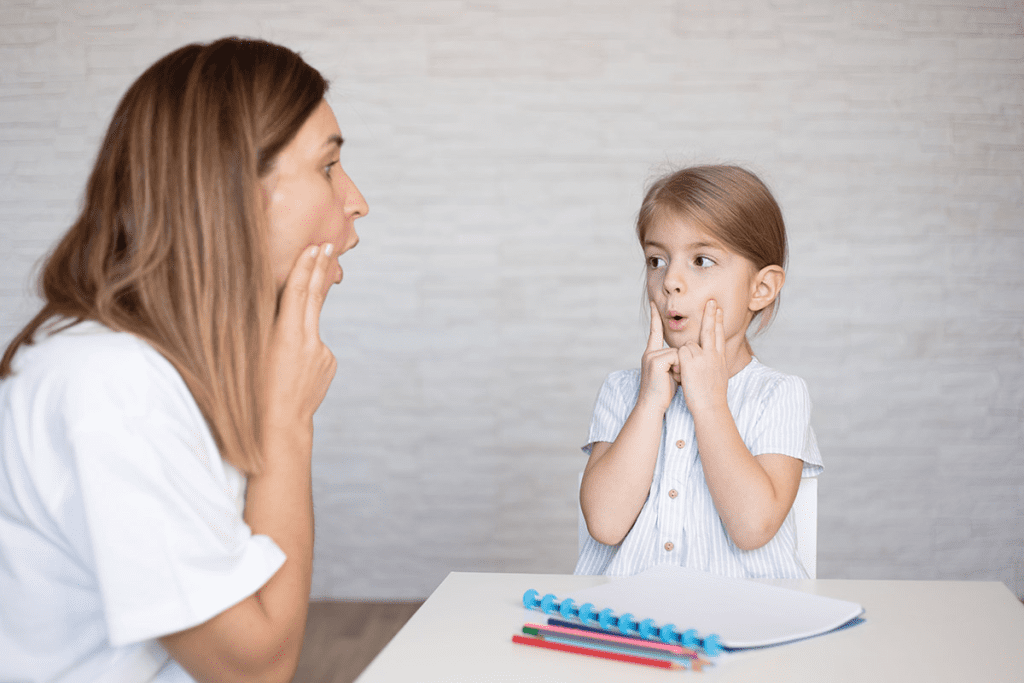Understanding child development is key. Developmental delays don’t always mean a child has autism. It’s important to know the difference between a developmental delay and autism.

In the U.S., 1 in 6 children aged 3-17 has a developmental disability. But only about 1 in 36 is diagnosed with autism. This shows we need to make sure we’re diagnosing correctly.
We’ll look into how developmental delays and autism are connected. We’ll see why getting the right diagnosis matters and what factors are involved.
Key Takeaways
- Developmental delays are not always a sign of autism.
- Accurate diagnosis is crucial for appropriate support.
- The prevalence of developmental disabilities is higher than autism diagnoses.
- Understanding the differences between developmental delays and autism is essential.
- Early intervention can significantly impact a child’s development.
Understanding Developmental Delays in Children
Developmental delays happen when a child doesn’t reach certain milestones on time. It’s key for parents and caregivers to know about these delays to help their kids.
What Constitutes a Developmental Delay
A developmental delay means a child is slow in reaching certain skills. This can be in thinking, moving, talking, or feeling emotions. These delays can show up in many ways, like trouble with talking, solving problems, or getting along with others.
Cognitive delays make it hard for kids to think, learn, and solve problems. Sensorimotor delays affect their motor skills, like fine and gross motor abilities. Speech and language delays make it hard for kids to communicate. Lastly, socioemotional delays make it tough for kids to interact with others and handle their feelings.

The Statistics: Developmental Delays vs. Autism
The Centers for Disease Control and Prevention (CDC) says about 8.5% of kids in the U.S. have a developmental disability. This includes autism spectrum disorder (ASD) and “other developmental delay.” These numbers show how common developmental delays are in kids.
It’s important to know the difference between developmental delays and autism. Both have challenges, but they need different kinds of help. Knowing the difference helps in giving the right support.
5 Common Types of Developmental Delay Not Related to Autism
Children can face different kinds of developmental delays, not all linked to autism. It’s normal to worry if your child isn’t growing as fast as others. Knowing about these delays can ease your mind and help find the right help for your child.
Speech and Language Delays
Speech and language delays are common. Kids might struggle to make sounds, speak in sentences, or get language. It’s key to tell speech delay vs autism apart. While some with autism have speech issues, not all delays mean autism. Hearing problems, developmental issues, or other factors can cause these delays.
Motor Skills Delays
Motor skills delays mean trouble with physical actions like crawling, walking, or fine motor tasks. Kids might seem clumsy or have coordination issues. These delays can stem from early birth, genetic issues, or muscle problems.
Cognitive Delays
Cognitive delays affect how a child processes info, learns, and adapts. Kids with these delays might take longer to grasp and act on instructions. Early intervention is key, and there are many educational ways to support them.
Social and Emotional Delays
Social and emotional delays make it hard for kids to interact, manage emotions, and form bonds. While some signs might look like autism, autism or speech delay are different. Kids with these delays can benefit from therapies that improve social and emotional skills.
Global Developmental Delays
Global developmental delay means big delays in many areas, like thinking, moving, and speaking. It’s important to know the difference between global developmental delay vs autism. While symptoms might seem similar, the support needed is different.
In summary, developmental delays come in many forms and aren’t always about autism. By learning about these delays and their causes, parents can find the right support. This ensures their child gets the help they need to do well.
7 Key Causes of Non-Autism Developmental Delays
It’s important to know why kids might develop slowly. These delays aren’t always because of autism. Knowing the reasons helps parents and caregivers help their kids better.
Hearing Loss and Sensory Issues
Hearing loss can really slow down a child’s growth. It makes it hard for them to learn to talk. Getting help early is very important to help them catch up.
Some kids have trouble with sounds or touch. This can make it hard for them to play and learn. They might get overwhelmed by certain things.
Environmental Factors
Where a child grows up matters a lot. Things like pollution, not eating well, and being poor can slow them down. For example, too much lead can hurt a child’s brain and behaviour.
- Exposure to environmental toxins
- Inadequate nutrition and healthcare
- Socio-economic disadvantages
Language Disorders
Some kids have trouble with words and talking. This makes it hard for them to share ideas. Speech therapy can help them get better at talking.
Intellectual Disabilities
Intellectual disabilities can also slow down a child’s growth. Kids with these disabilities need extra help in learning and doing things on their own. Special programs and support are key to helping them succeed.
Understanding why kids develop slowly helps parents and caregivers find the right help. Early action is crucial for kids with delays, no matter the reason.
How to Differentiate Between Autism and Other Developmental Delays
It’s important for parents to know the difference between autism and other developmental delays. Both can cause delays in development, but they have unique signs. Knowing these can help parents understand their child’s needs better.
Every child grows at their own pace. Some need more help than others. Autism Spectrum Disorder (ASD) is a complex condition. It affects how a child talks and interacts with others, and their behaviour and interests.
Key Differences in Social Interaction
Autism and other developmental delays differ mainly in social interaction. Children with autism find it hard to understand social cues and talk back and forth. Kids with other delays might just need more time to learn these skills.
For example, a child with a delay might have trouble speaking but still wants to connect. But a child with autism might find it hard to start or keep a conversation going.
Communication Pattern Variations
Communication patterns also show big differences. Children with autism might repeat words or use language in odd ways. Kids with other delays might speak later, but usually use language correctly.
Some children with autism might speak very well or have their own way of communicating. This can sometimes be mistaken for being very smart or having a different learning style.
Behavioural and Interest Distinctions
Behaviour and interests also set autism apart. Children with autism often have restricted or repetitive behaviors like hand flapping or intense interests. Kids with other delays might have tough behaviours, but they’re not as focused or repetitive.
Understanding these differences is key to helping children and their families. By knowing the unique signs of autism and other delays, we can offer the right support and help.
Early Intervention Strategies for Children with Developmental Delay
Early intervention is key for kids with developmental delays. It greatly affects their future. These delays can slow down speech, motor skills, and social skills.Understanding developmental delay is the first step to helping these children.
When to Seek Professional Help
If you think your child might be delayed, get help fast. Early intervention can make a big difference in their life. Look for signs like slow speech, trouble with motor skills, or social issues. If you’re worried, talk to your pediatrician or a specialist for advice.
Types of Therapies and Interventions
There are many therapies and interventions for kids with delays. These include:
- Speech and Language Therapy: To boost communication skills.
- Occupational Therapy: To improve motor skills and daily tasks.
- Physical Therapy: To enhance mobility and coordination.
- Behavioural Therapy: To handle behavioural issues and encourage good habits.
These therapies can be customized for each child. A team of experts will work with you to create a detailed plan.

The Role of Parents in Supporting Development
Parents are crucial in supporting their child’s growth. By teaming up with therapists and doctors, you can strengthen the skills learned in therapy. Creating a supportive and nurturing home environment is essential. This means:
- Doing activities that help learning and development.
- Using positive feedback to encourage good behaviour.
- Keeping in touch with your child’s therapy team.
Working with professionals and creating a supportive home can greatly help your child’s development.
Conclusion: Supporting Your Child’s Unique Developmental Journey
Parents need to know that a child can have developmental delays without having autism. Developmental delay means a child is not growing as expected in physical, cognitive, or emotional areas. This is compared to their age.
We’ve looked at different types of developmental delays, why they happen, and how they differ from autism. Getting the right diagnosis is key to offering the best support. Early help, like therapies and getting involved as a parent, is crucial for kids to overcome their challenges.
Every child grows at their own speed, and with the right help, they can reach their full potential. As a parent, being well-informed and active can greatly help your child. Knowing about developmental delays and the help available can support your child’s unique needs and help them succeed.
FAQ’s:
Is autism a developmental disability?
Autism is a neurodevelopmental disorder. It can be linked to developmental delays. But not all delays mean a child has autism.
What is the difference between speech delay and autism?
Speech delay means a child is slow to talk. Some kids with autism might have this. But not all delays are autism. Hearing loss or language issues can also cause delays.
What are the main categories of developmental delays?
There are four main types of developmental delays. These are cognitive, sensorimotor, speech and language, and socioemotional. They help us understand how delays can show up differently.
How common are developmental delays compared to autism?
The CDC says more kids have developmental delays than autism. Many children face delays, but autism is less common.
Can environmental factors cause developmental delays?
Yes, things like toxins, lack of stimulation, or socio-economic issues can lead to delays in kids.
What is global developmental delay vs autism?
Global developmental delay means a child is slow in many areas, like thinking, moving, and talking. Some kids with this might also have autism. But they are different conditions that need a full check-up to diagnose.
How late can autism develop?
Autism is usually spotted by age 2 or 3. It can be diagnosed later, but this is rare. Early signs are often missed or misunderstood.
What is the role of parents in supporting a child with developmental delay?
Parents are key in helping their child grow. They create a caring space, join in therapies, and fight for their child’s needs. Early help and ongoing support are crucial for a child’s development.
What are the key differences in social interaction between autism and other developmental delays?
Kids with autism often struggle with eye contact, social cues, and talking back and forth. Other delays might also affect social skills, but autism’s challenges are unique and more pronounced.
REFERENCES:
Lizard Centre. (2022, October 30). Global developmental delay vs autism: Understanding the differences and similarities.https://lizardcentre.com/global-developmental-delay-vs-autism/
Super Kids Consulting. (2024, August 18). The differences: Global developmental delay and autism.https://superkidsconsulting.com.au/understanding-the-differences-global-developmental-delay-vs-autism/
Fratnow, A. (2024, February 2). Developmental delay vs autism spectrum disorder (ASD).https://autism.fratnow.com/blog/developmental-delay-vs-autism-spectrum-disorder/



































